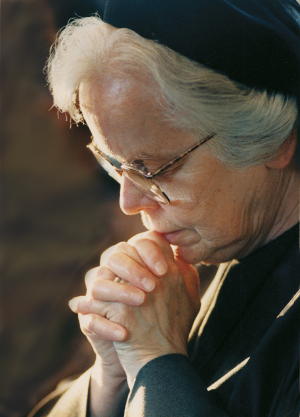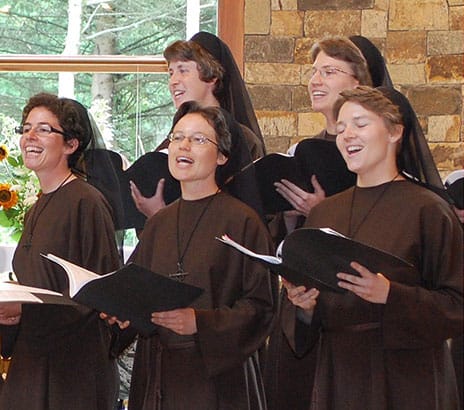Our charism emboldens us to focus on these issues in our mission of rebuilding the Church:
Our mission is to restore a sense of the sacred, especially the sacredness of human life, in a world that knows the rupture between the sacred and the secular.
We are proud to say that many wonderful and talented young women have found new life in entering and becoming vital members of the community.
As a Corporate Body speaking with one voice, we are dedicated to the teachings of the church and maintain authentic perennial values while initiating new forms of apostolic service.
Who Are We?
Our way of life is centered by community bonding with a strong foundation for our many outreach programs.

We make a life commitment to God, to the Church and to one another to be bonded together in the profession of Religious Vows of Chastity, Poverty and Obedience in community.

We dedicate ourselves to serve the needs of the people in centers throughout the world, providing stable, nourishing centers of life.

We wear a religious habit and veil as witness to our interior commitment to be a “sign of contradiction,” to be women totally given to the Church’s mission throughout the world.

We wear a simple cross of nails with a circular band of metal signifying the penetrating power of the Cross and the integrating power of the Eucharist.

We expect ongoing professional excellence of one another, incorporating each Sister’s talents into a network of interrelated services.

We pray daily in community. Our Eucharistic dedication impels us to a life of prayer and becomes the way of integration for the activities, creative tensions and problems presented to us in our various works.

We enter into relationships that bring us into psychological and spiritual wholeness.

We are bonded together in trust, sharing all important decisions in common.

We believe in a structure of authority, which, as spiritual touchstone, challenges the community to more intense levels of faith.

We collaborate with other Religious Orders of men and women to serve most fruitfully the mission of the Church.

Remember the Rock
from Which We Were Hewn
Mother Rosemae Pender, FSE
September 11, 1921 – June 26, 2016
We remember with profound love and lively joy, Mother Rosemae Pender, FSE, our Mother Foundress, who is our constant inspiration in our efforts “to rebuild the Church by being a Eucharistic Body filled with the dimensions of the Church” as she frequently urged us.
“I bless you all that I can and more than I can, and what I cannot do, I ask God to do in you.”
We are called to be a Franciscan Body of Hope personally, professionally and spiritually prepared to respond creatively “to the questions posed today by the anxieties and the urgent needs of the human heart” (Vita Consecrata, 81).
In the spirit of St. Francis and St. Clare, we promote fruitful interrelationships among priests, religious, and the lay faithful as a way of fulfilling our Call to “rebuild the Church.”
Our life together as One Body is strengthened by the spousal commitment of each Sister.
Frequently Asked Questions
A vow is a promise made to God and sanctioned by the Church. We profess three vows: chastity, poverty and obedience. These vows are known as the “evangelical counsels,” in other words, they are ways to help men or women live a life according to the Gospel of Christ. The vows are taken for life, and they free the Sisters to dedicate themselves wholeheartedly to their vocation.
There is no set age at which to discover that God is calling you to religious life. While some Sisters knew in their youth that they had a special calling from God, many women realize in their twenties or very early thirties that they are not satisfied with their lives and are looking for more meaning. Coming to that point often takes time and is an inner process of growth. A religious vocation is a precious gift from God that stirs the hearts of men and women to give their all. Relating to a religious community is one of the best ways to discover whether God might be calling you through a religious vocation.
Most women who begin the formation process with our Community have a college degree and/or significant work experience. Many women continue their studies after their entrance into our Community in order to continue their personal and professional development.
Our Sisters work in a wide variety of professional settings that can be integrated into our common life and mission. During the years of formation, the community seeks to discover and to integrate the talents and gifts of each Sister in preparation for her participation in the apostolic ministry of the community. While a Sister usually is asked to work as she has been professionally trained, ultimately, the Mother General assigns the Sister to the apostolate she deems best for the Sister and for the community.
New centers are founded by our Community in response to particular needs and requests of our Church. Our authority persons discern each request, so as to determine if the foundation of a new center can be integrated into our one common mission and whether or not we have the resources to provide for the particular need that is being requested.
A source that inspired the community in its founding was Sacred Scripture, especially the writings of St. Paul and his insight into the Church as the Body of Christ: “For as in one body we have many parts, and all the parts do not have the same function, so we, though many, are one body in Christ and individually parts of one another” (Rom 12: 4-5). The life of Saint Francis was instrumental during our time of foundation as we worked towards embodying the original charism and spirit of our founding father. The Vatican II decree on the Adaption and Renewal of Religious Life, Perfectae Caritatis, gave us guiding principles in this process of renewal: “The adaptation and renewal of the religious life includes both the constant return to the sources of all Christian life and to the original spirit of the institutes and their adaptation to the changed conditions of our time.” In addition the Papal writings of Pope Paul VI, Pope John Paul II and Pope Benedict XVI (e.g. Humanae Vitae, the Theology of the Body, Vita Consecrata, Laborem Exercens, Evangelium Vitae and Deus Caritas Est) were and continue to be sources of inspiration to nurture the faith of our Sisters as we live our charism of promoting the sacredness and dignity of all life.
The Franciscan Sisters of the Eucharist sponsor the Franciscan Brothers of the Eucharist, a Public Association of the Faithful approved by the Archdiocese of Hartford, with hopes of the Brothers being aggregated as a men’s branch of our order. In the spirit of Saint Francis and Saint Clare, we work in complement with the Franciscan Brothers of the Eucharist in our mission of rebuilding the Church.
Contact us by email, phone or mail and we will be happy to respond.
Yes, the Franciscan Sisters of the Eucharist is a Pontifical Religious Order of the Catholic Church.
As a religious Community we strive to integrate each Sister’s gifts and talents into our common Franciscan mission of rebuilding the Church while promoting the dignity of all life, especially human life. We recognize that this mission can be served through a network of services and professions. Thus our community does not have a single area of professional work.
We participate in the Eucharistic Prayer of the Church each day through the Mass. Each day we pray together as a Community the Liturgy of the Hours, the official prayer of the Church in the morning, evening and night. We also spend time in meditation, reflection and personal prayer every day in our chapels. As a Eucharistic Community, we have a special devotion to the Blessed Sacrament, and have hours of adoration on a regular basis.
The process of becoming a Sister includes these phases: pre-postulancy for an unspecified period of time, postulancy for one year, novitiate for two years, first vows for three to nine years, and perpetual vows which lasts for the rest of the Sister’s life. During the time of formation, the woman discovers the meaning of a vocation from God, and with the Community, how her gifts and talents might become integrated in the mission of the Franciscan Sisters of the Eucharist.
What we wear is called a “habit.” We wear this distinctive clothing to make it apparent that we are religious women, but more significantly, we believe that the particular habit we wear expresses who we are as Religious Women bonded together in the Community of the Franciscan Sisters of the Eucharist. Our habit is a simple full length brown dress with a brown Franciscan cord, a black veil and our community insignia. At the time of perpetual vows, a Sister receives a ring to be worn on her left ring finger.
Each woman receives a religious name from our Mother General at the time of her entrance into the novitiate. The reception of a religious name is a sign of a woman’s particular call within the Franciscan Sisters of the Eucharist. A woman’s baptismal name may be incorporated into her religious name, or the Mother General may decide to retain the woman’s baptismal name as her religious name.
Growth Starts Here.



